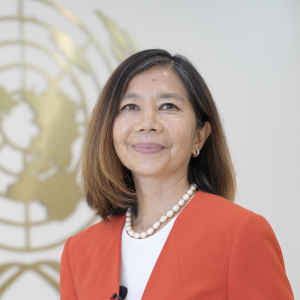National Closing Workshop Institutional Strengthening and Capacity Building (ISCB) Project
Opening Remarks by Ms. Pauline Tamesis - UN Resident Coordinator in Viet Nam
- Excellency Vice Minister Pham Minh Ha, Ministry of Construction
- Mr. Aldo De Luca, Deputy Head of the Embassy of Switzerland
- Distinguished representatives of the local government of Viet Nam
On behalf of the United Nations in Viet Nam, it is an honour to join you today at this closing workshop of the Institutional Strengthening and Capacity Building ISCB project led by UN-Habitat.
Let me begin by acknowledging the Ministry of Construction for its leadership, the Ministry of Finance for its coordination role, and the Government of Switzerland – our valued partner -- for its long-standing commitment to Viet Nam’s urban transformation. I also wish to thank the local authorities, especially from Tam Ky and Ben Tre, for their strong engagement and ownership of the project.
The rapid urbanisation of Viet Nam has brought with it enormous opportunities for economic growth, innovation, and poverty reduction. But it has also introduced complex and interlinked challenges: environmental degradation, spatial inequality, overstretched infrastructure, and new forms of vulnerability – particularly in the face of climate change and public health risks.
Against this backdrop, the ISCB project has made a meaningful contribution toward Viet Nam’s sustainable and inclusive urban development. It has helped strengthen institutions, pilot practical tools, and advance knowledge-based, people-centred planning. It has done so not through grand declarations, but through the steady, often quiet work of building capacity, testing approaches, connecting institutions, and listening to communities. We are pleased to have supported this process alongside the Ministry of Construction and our development partners.
Distinguished participants,
Today’s event is not a closure – but a transition point. From experimentation to institutionalisation. From vision to systems change. And from working in silos to working in synergy. It offers a moment to reflect on what we have learned, and to look ahead – together – to what is still possible.
Let me share three reflections from the United Nations in this regard:
First, the ISCB project demonstrates the power of multi-level and multi-sectoral collaboration. The achievements we see today – from improved planning tools to more inclusive urban practices – were made possible because national ministries, local governments, technical institutes, communities, and international partners all came together around a common purpose. This is the spirit of the whole-of-government and whole-of-society approach that Viet Nam is promoting. It is also at the heart of UN reforms – calling for integration, innovation, and collaboration to deliver better results for people and planet.
Second, the project’s outputs – such as the policy briefs, training materials, planning handbook, and participatory tools – form a practical knowledge package that can support national and sub-national stakeholders as they navigate the next phase of urban reform. These tools respond directly to Viet Nam’s current priorities: strengthening institutional capacity, modernising legal frameworks, promoting public-private-community partnerships, and fostering green and resilient urban spaces.
Third, the project offers a concrete model of how international cooperation can be strategic, responsive, and nationally owned. The work in Tam Ky and Ben Tre – with their diverse local conditions – shows how integrated planning and community engagement can deliver more inclusive, locally anchored outcomes. These experiences are timely as Viet Nam is embarking on important structural reforms – including urban legal harmonisation, district and provincial restructuring, and the development of national urban strategies aligned with Resolution 06 and Resolution 66.
Excellencies, colleagues,
As Viet Nam looks toward the future, the urban agenda will become even more central. By 2040, two-thirds of the population will live in cities. And these cities will need to deliver on many fronts: climate resilience, housing, mobility, productivity, and digital inclusion – all while leaving no one behind. UN-Habitat’s Strategic Plan 2026–2029 calls for exactly this kind of transformation:
• Cities that are inclusive and people-centred,
• Systems that are adaptive and interoperable, and
• Governance that is responsive and participatory.
Sustainable urban development requires long-term commitment. It calls for patience, for experimentation, and partnerships deepen in mutual respect and shared responsibility. The progress we see today is not the result of a single effort – but the outcome of many institutions, over many years, working towards a common goal. Cities are where innovation happens, where climate action must take root, where the SDGs will be won or lost. That is why the United Nations will continue to support Viet Nam in building inclusive, climate-resilient, and forward-looking cities.
Through the UN Sustainable Development Cooperation Framework, we will work to bring together policy advice, data innovation, financing options, and capacity support – with and for the people of Viet Nam. And through partnerships like this one – with Switzerland, with the Government of Viet Nam, and with local communities – we aim to turn commitments into action.
Let us carry forward the momentum of this project to inspire bolder, broader, and more inclusive collaboration. Let us continue to build cities that leave no one behind, that unlock human potential, and that serve as engines for sustainable development.
The United Nations is proud to be your partner on this journey.
Thank you. Xin cảm ơn.
Speech by




